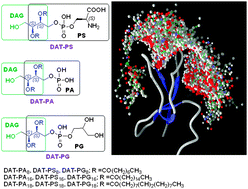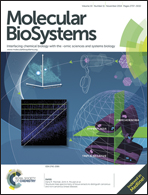Synthesis and protein kinase C (PKC)-C1 domain binding properties of diacyltetrol based anionic lipids†
Abstract
The protein kinase C (PKC) family of lipid-activated kinases plays a significant role in the regulation of diverse cellular functions including tumor promotion, apoptosis, differentiation, and others. The lipophilic second messenger diacylglycerols (DAGs) act as endogenous ligands for the PKCs in the presence of anionic phospholipids. To develop effective PKC regulators and understand the importance of anionic phospholipids in DAG binding of PKC isoforms, we conveniently synthesized octanoic acid containing diacyltetrol (DAT) based hybrid lipids with both DAG and anionic phospholipid headgroups within the same molecule. We also used palmitic and oleic acid containing hybrid lipids for additional understanding of the PKC-C1 domain binding mechanism. Biophysical studies showed that hydrophobic side chains, DAG and anionic phospholipids headgroups are necessary for their interaction with the C1-domain of PKC isoforms. The hybrid lipids DAT-PS and DAT-PA specifically interact with the PKCδ-C1b and PKCθ-C1b subdomains and showed 5- and 2.5-fold stronger binding affinity compared with DAG, respectively. Whereas, the PKCα-C1a subdomain interacts with the hybrid lipids, without any significant specificity. The present results show that hybrid lipids bind to the PKC C1b/a subdomains and can be further studied to decipher their binding mechanism and biological activities. This study proposes a new concept of developing PKC activators by using tetrol-based anionic hybrid lipids having both phospholipids and diacylglycerol headgroups within the same molecule. This study also supplies useful information for the binding potencies of hybrid lipids with PKC-C1 domains.


 Please wait while we load your content...
Please wait while we load your content...